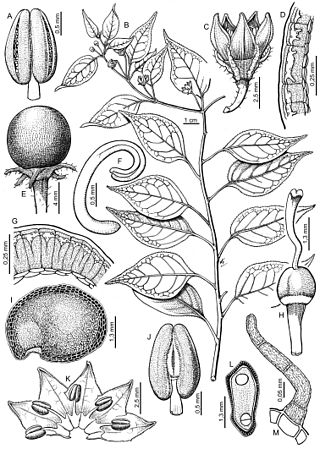Top Qs
Timeline
Chat
Perspective
Capsicum eximium
Species of flowering plant From Wikipedia, the free encyclopedia
Remove ads
Capsicum eximium is a member of the genus Capsicum with 2n=2x=24, and native to the New World, specifically the Andean region of South America.[1] It is one of the "purple-flowered" Capsicums along with Capsicum cardenasii and Capsicum pubescens.[2] Like most other chili peppers, it is both pungent and self-compatible.[3] It is a member of the Pubescens complex, a natural group of highly related Capsicums.[4] Natural hybrids between C. pubescens as well as C. tovarii have been found, further supporting the relationship of these species.[5]
Remove ads
Plant description
Capsicum eximium is identified by its distinctive purple flowers. The flowers have an entire calyx and bell-shaped corolla that come in various shades of purple. Mature fruit of C. eximium are small, shiny, non-pulpy berries. The seeds are yellow.[6][7]
Uses
In Bolivia, where the plants occur naturally, C. eximium is used as a spice.[6] Also, since it is a wild pepper species, it has been used extensively in phylogenetic studies to better understand the relationships of peppers and different gene models.[1]
References
Wikiwand - on
Seamless Wikipedia browsing. On steroids.
Remove ads

